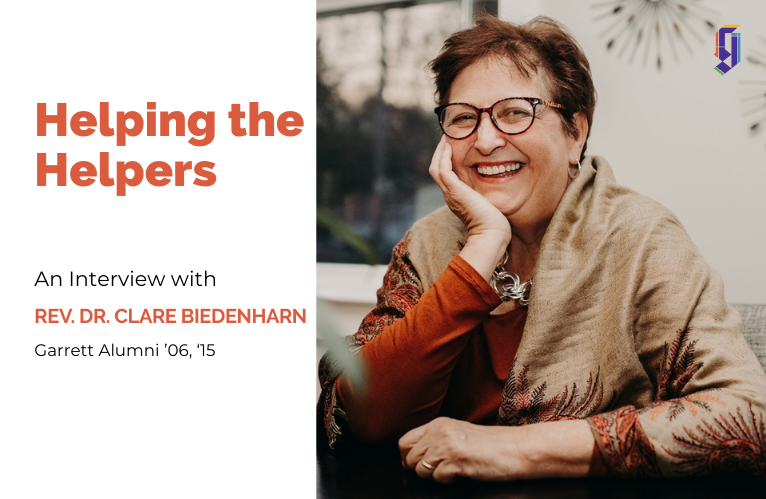Helping the Helpers
October 17, 2024
An Interview with the Rev. Dr. Clare Biedenharn ’06, ‘15

Healthcare workers are experiencing a burnout crisis. Since the pandemic began, rising workplace stress and staffing shortages have pushed medical professionals to the brink. This disturbing trend is particularly acute among nurses: In 2023, a study by the American Medical Association found that 56% of nurses were overburdened, and 41% planned to leave their job within two years. While caring for patients is sometimes depicted as chaplains’ sole charge, they are called to minister to everyone in a hospital. Rev. Clare Biedenharn (GETS – ’06, ’15) takes that responsibility seriously: She and her research team are planning a study to investigate how to reduce nurse burnout. In a potent sign that this is something the world desperately needs, The National Institute of Health selected their proposal to move into the next round for a $275,000 grant.
Their study is based on research Rev. Biedenharn completed for her Garrett DMin dissertation, listening to ICU nurses at East Jefferson General Hospital, New Orleans. “Listen, healthcare is in a hot mess,” she admits. “Nurses feel like widgets, and have been moved so far away from that initial loving impulse of wanting to help people.” Part of her approach is to reconnect nurses with their original sense of call. “My favorite question is, ‘Why did you want to become a nurse?’” she shares. “Suddenly, they’ll stop, look kind of wistful and talk about how they helped care for their grandfather. Or, at the hospital I worked at in New Orleans, some of those nurses started as candy stripers—high school volunteers—and have been there for 20-25 years.” By grounding people in that call, she hopes to build resilience toward inevitable workplace stressors. “I love that I can help people remember and reconnect, to know how they’re part of a bigger picture,” she says.
Part of what motivates Rev. Biedenharn is gratitude to nurses who helped revive her own sense of purpose. In her last local church ministry appointment, she was told she couldn’t preach or teach because she was a woman. She left that job for a chaplaincy position but was so harmed by the experience she wasn’t sure she could offer meaningful care. “When I came to that hospital, I was so beat down by that church, I really felt worthless. In fact, when they were making assignments, I thought, ‘I’ll just sit back and take whatever is left,’” she confesses. “The only thing left was the ICU and those nurses did for me what they do for their patients. I came to that third floor broken and sick, and they picked me up and got me going again.”
Nearly thirty years later, Rev. Biedenharn has helped lead wider changes in how chaplains operate as part of hospitals’ care team. “We were kind of a bunch of cowboys at first,” she laughs. “If you were a religious person, you could just show up an offer care. Now, there’s a big push for research, for professional credentials, so we can have a real seat at the table.” Throughout all the changes, it’s the same love for ministry that sustains her. “As chaplains, we get to be a symbol of God’s grace and presence,” she says with joy. “It’s such an honor to keep asking open questions—not to give people solutions, but to help them tap into their own resources.”

